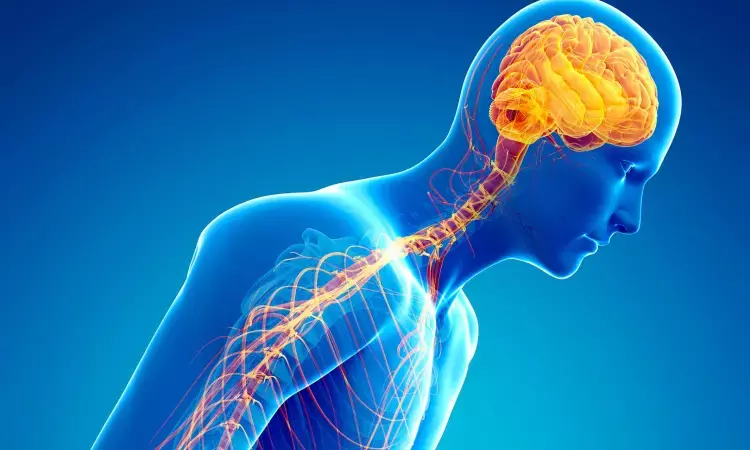- Home
- Medical news & Guidelines
- Anesthesiology
- Cardiology and CTVS
- Critical Care
- Dentistry
- Dermatology
- Diabetes and Endocrinology
- ENT
- Gastroenterology
- Medicine
- Nephrology
- Neurology
- Obstretics-Gynaecology
- Oncology
- Ophthalmology
- Orthopaedics
- Pediatrics-Neonatology
- Psychiatry
- Pulmonology
- Radiology
- Surgery
- Urology
- Laboratory Medicine
- Diet
- Nursing
- Paramedical
- Physiotherapy
- Health news
- Fact Check
- Bone Health Fact Check
- Brain Health Fact Check
- Cancer Related Fact Check
- Child Care Fact Check
- Dental and oral health fact check
- Diabetes and metabolic health fact check
- Diet and Nutrition Fact Check
- Eye and ENT Care Fact Check
- Fitness fact check
- Gut health fact check
- Heart health fact check
- Kidney health fact check
- Medical education fact check
- Men's health fact check
- Respiratory fact check
- Skin and hair care fact check
- Vaccine and Immunization fact check
- Women's health fact check
- AYUSH
- State News
- Andaman and Nicobar Islands
- Andhra Pradesh
- Arunachal Pradesh
- Assam
- Bihar
- Chandigarh
- Chattisgarh
- Dadra and Nagar Haveli
- Daman and Diu
- Delhi
- Goa
- Gujarat
- Haryana
- Himachal Pradesh
- Jammu & Kashmir
- Jharkhand
- Karnataka
- Kerala
- Ladakh
- Lakshadweep
- Madhya Pradesh
- Maharashtra
- Manipur
- Meghalaya
- Mizoram
- Nagaland
- Odisha
- Puducherry
- Punjab
- Rajasthan
- Sikkim
- Tamil Nadu
- Telangana
- Tripura
- Uttar Pradesh
- Uttrakhand
- West Bengal
- Medical Education
- Industry
Levodopa Use Tied to Reduced Incidence of neovascular age-related macular degeneration

Previous studies have mentioned that Levodopa is tied to reduced development of new-onset neovascular age-related macular degeneration (nAMD).
Data has shown that using Levodopa (cumulative two-year doses) between ∼100-300mg per day and >∼300mg decreased the odds of developing nAMD by 14% and 23%, respectively.
Levodopa is the precursor to dopamine. It is commonly used by Physicians as a dopamine replacement for managing Parkinson's disease.
Levodopa is most effective in improving the quality of life in such patients. It is generally prescribed to a patient once bradykinetic symptoms become more difficult to control with other anti-parkinsonism medications.
Previous data have suggested the positive efficacy of Levodopa for AMD by targeting GPR143 in retinal pigment epithelium cells. This downregulates vascular endothelial growth factor (VEGF) cells in response to Levodopa. The study results proved that Levodopa is safe, well tolerated, and delayed anti-VEGF injection therapy with improvement in visual outcomes.
In the present study, researchers performed three studies. One with eyes with nAMD and two years of follow; the second included eyes with non-neovascular AMD and 1 - 5 years of follow-up; and the third included patients aged 55 years and older with newly diagnosed nAMD matched to controls without nAMD.
The study results are:
- The eyes were divided into two groups: those exposed to Levodopa before or on the date of neovascular (group 1) or non-neovascular AMD group (group 2) and those not exposed to Levodopa.
- Researchers determined the cumulative 2-year dose, namely, <100mg, ∼100-300mg, and >∼300mg per day.
- The number of intravitreal injections was the primary outcome.
- The eyes with nAMD exposed to Levodopa underwent fewer intravitreal injections.
- The eyes with non-neovascular AMD exposed to Levodopa had a reduced risk of nAMD conversion by 21 %.
- Eyes with non-neovascular AMD experienced a 35% reduced risk of conversion at years 3 – 4.
Cumulative 2-year doses of Levodopa between ∼100-300mg per day and >∼300mg decreased the odds of developing nAMD by 14%.
"Levodopa use was associated with reduced detection of new-onset neovascular AMD," investigators wrote.
Further reading:
BDS, MDS in Periodontics and Implantology
Dr. Aditi Yadav is a BDS, MDS in Periodontics and Implantology. She has a clinical experience of 5 years as a laser dental surgeon. She also has a Diploma in clinical research and pharmacovigilance and is a Certified data scientist. She is currently working as a content developer in e-health services. Dr. Yadav has a keen interest in Medical Journalism and is actively involved in Medical Research writing.
Dr Kamal Kant Kohli-MBBS, DTCD- a chest specialist with more than 30 years of practice and a flair for writing clinical articles, Dr Kamal Kant Kohli joined Medical Dialogues as a Chief Editor of Medical News. Besides writing articles, as an editor, he proofreads and verifies all the medical content published on Medical Dialogues including those coming from journals, studies,medical conferences,guidelines etc. Email: drkohli@medicaldialogues.in. Contact no. 011-43720751


